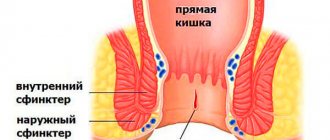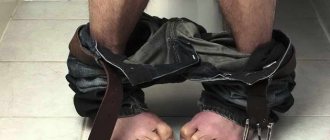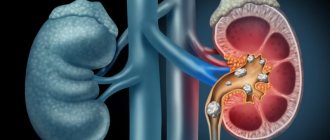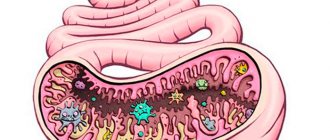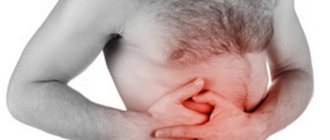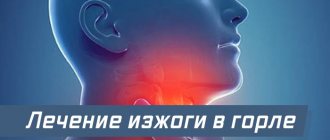There are a number of diseases that are not commonly discussed in polite society. One of these unpleasant situations is considered to be a burning sensation in the rectum in both men and women. People, embarrassed by their problem, simply ignore it, because they are ashamed to ask and ask for advice from a doctor. Under no circumstances should this unpleasant symptom be left to chance. There is nothing shameful in wanting to be healthy.
Therefore, as soon as you feel a burning sensation in the anus, consult a doctor immediately. This may be a sign of a serious disease that develops directly in the intestines.
Pain and burning in the anus after defecation
Defecation disorders are determined using defectography. Usually the disease has only one symptom - this is rectal prolapse, which, if pinched, can cause quite severe pain during bowel movements and a burning sensation.
Hemorrhoids develop in severe forms of constipation, after childbirth, with a sedentary lifestyle or with frequent strain. During defecation, hemorrhoidal nodules prolapse through the anus, which causes pain in the anus.
Itching and burning in the anus
The causes of anal fissure lie in damage to the mucous membrane of the anal sphincter due to hard feces, loose stools, and also due to exotic sexual relations.
If rapid healing does not occur, then a chronic anal fissure may form, and the process will constantly worsen.
Pain during and after defecation, as well as pain in the abdomen, can occur against the background of a spasm of the smooth muscles of the sigmoid colon, which occurs with severe constipation, requiring powerful tension. Defecation after each meal is most often associated with accelerated peristalsis, which is observed in irritable bowel syndrome.
Sometimes bowel movements after each meal and chronic abdominal pain are observed with pancreatitis, which is especially common in alcoholics.
False urge to defecate and the feeling of incomplete bowel movement are dangerous symptoms.
Alas, false urges do not arise in the first stage of rectal cancer. With the development of any pathological process in the rectum, not only false urges are characteristic, but also pain during defecation.
False urge to defecate, also called tenesmus, is not a good symptom! Burning during bowel movements: the reasons that cause burning are due to the occurrence of damage to the mucous membrane of the rectum or anus.
Rectal polyps, when injured by feces, can cause symptoms similar to an anal fissure. A burning sensation in the anus can be a sign of many diseases, and only a small part of them symbolize problems of the rectum. Let's look at these reasons in more detail.
It got better, but a few months after defecation a burning sensation appears (outside) around the anus. Treatment of the underlying disease necessarily includes symptomatic treatment of itching and burning near the anus.
Not only women, but also men have more than once encountered such an alarming phenomenon as itching and burning in the anus. This type of pathology develops under the influence of significant factors and is subject to mandatory examination, as it is a sign of various serious diseases in the body, often associated specifically with the intestines. It is this fact that affects the patient psychologically, causing him a feeling of discomfort, embarrassment, and indecision.
Treatment with folk remedies at home
Lotions with chamomile infusion will help relieve itching
This method of treatment should be carried out only in consultation with the attending physician; it is he who will determine the absence of contraindications to their use.
Among the effective methods are:
- Lotions with a decoction of chamomile and potato juice.
- Washing with oak bark decoction.
- Tinctures of mint, linden blossom or yarrow.
- Baths with calendula or birch buds.
Timely, thorough diagnosis and adequate treatment leads to the rapid development of positive dynamics. Patients who are faced with a similar problem should not self-medicate, as this can lead to serious complications.
You can learn more about the causes of itching in the anus by watching the video:
Read along with this article:
- Pain in the rectum: causes of discomfort
- Analysis of the reasons that provoke burning in the anus in women
- Rectal ulcer, symptoms, causes and possible complications
- How to treat itching in the anus: a detailed analysis of such...
- The first signs of hemorrhoids do not always attract attention
- Why does pain occur in the anus?
- Tubular adenoma of the rectum: symptoms, treatment and prognosis
- The length of the human rectum, its age characteristics
- Causes of intestinal bleeding
Causes of burning
When talking about factors that contribute to the occurrence of such a phenomenon as burning in the anus, it should be understood that they are acquired. Very often the causes of burning are provoked by:
The main, most common factor is neglect of personal hygiene. That is, the patient avoids frequent washing of the anus, after defecation uses rough toilet paper that irritates the skin, and rarely changes underwear, which leads to the formation of bacteria and microbes. This attitude to hygiene is especially dangerous in cases of constipation, when the patient often encounters anal fissures, where feces and various microbes easily enter. Therefore, it is not surprising that over time an alarming burning sensation appears.
Prostatitis
. Often infectious prostatitis is the cause of the pathology in question. An infection from the genitourinary system enters the rectum, thereby causing a burning sensation in the anus. Therefore, it is so important to treat infectious prostatitis in a timely manner so that it does not cause the development of other diseases.
Internal (external) hemorrhoids
. The patient knows about the presence of external hemorrhoids even without a doctor’s diagnosis. But often the cause of burning and itching in the anus is internal hemorrhoids. The patient, while maintaining these feelings of discomfort for a long period, does not realize that they are caused by internal hemorrhoids, which can, in addition, cause bowel problems and constipation. Along with a burning sensation, the patient is concerned about pain and the appearance of blood after defecation.
Cracks
. Addiction to anal sex, constipation, internal hemorrhoids and other factors are caused by anal fissures. When an infection or feces gets into the crack, an unpleasant burning sensation and itching occurs.
Polyps.
Polyps are benign growths on the rectal mucosa. Despite the fact that they are not a serious threat, they can, however, cause the patient a lot of unpleasant sensations, not least among which are: bowel dysfunction, increased gas formation, itching, burning in the anus.
Chronic proctosigmoiditis
. Chronic proctosigmoiditis is characterized by obvious inflammation of the rectum, which involves disruption of the functioning of some abdominal organs. Often, making a correct diagnosis is a serious problem for a doctor, since disruption of some organs distorts the real picture. One of the symptoms of chronic proctosigmoiditis causes a strong burning sensation.
Dysbacterial manifestations of the rectum
. Intestinal dysbiosis is a very common phenomenon that affects almost everyone - children, women, men. The causes of dysbiosis are diverse, but they all lead to disruption of the natural intestinal microflora, manifested by disruption of normal stool (constipation or diarrhea), the formation of various microbes and bacteria. Frequent urge to defecate ultimately causes an unpleasant burning sensation in the anus.
Using intimate hygiene products
. Often, the use of intimate hygiene products can cause a burning sensation in the anus. This phenomenon is a sign of an allergic reaction, so the man must either stop using them or replace them with softer ones, which contain components that do not cause irritation to the skin adjacent to the anus.
Obesity
.Overweight and obese people complain more about a burning sensation in the anus. This is because the buttocks are touching too closely, causing irritation to the skin adjacent to the anus. This phenomenon occurs extremely often in the summer, when excessively high temperatures lead to the formation of the described phenomena.
How to deal with burning?
To get rid of the feeling of constant burning in the anus, the patient is not recommended to self-medicate, hoping for a quick relief from the unpleasant discomfort. The cause of the burning sensation can only be identified by a competent specialist, prescribing appropriate examination and treatment.
Burning in the anal area is a typical symptom of various intestinal and genitourinary diseases. Not every man will decide to visit a doctor with such a delicate problem. Still, there is no point in postponing the examination. Discomfort in the anus can be a manifestation of a serious pathology, which cannot be dealt with without the participation of a specialist. The sooner the cause of this condition is found, the more effective the prescribed treatment will be and the lower the risk of dangerous complications.
Hemorrhoids are one of the possible causes of burning in the anus
A burning sensation in the anus may be accompanied by other unpleasant symptoms. Itching, pain, purulent or bloody discharge - all this will indicate the development of one or another pathology. Knowing the signs of major diseases of the intestines and organs of the urinary system, you can assume a diagnosis and begin an examination to confirm it as soon as possible.
Haemorrhoids
Hemorrhoids are a pathological change in the venous nodes located around the rectum. Provoking factors for the development of hemorrhoids in men are physical inactivity, sedentary work, frequent constipation and excess body weight. The disease develops over years, and in addition to burning in the anus, it is manifested by the following symptoms:
- feeling of heaviness and pain in the anus;
- bleeding immediately after bowel movement.
Constipation and the need for strong straining provoke bleeding with hemorrhoids. Blood appears directly during defecation or immediately after it. Bleeding is usually insignificant, the blood is scarlet, less often dark cherry. Over time, hemorrhoids may fall out (when coughing, sneezing, defecation, or unrelated to them).
The following methods help to recognize hemorrhoids:
- digital examination of the rectum;
- rectal ultrasound;
- sigmoidoscopy (endoscopic examination of the rectum).
Hemorrhoids occur with a sedentary lifestyle
Treatment of hemorrhoids includes lifestyle modifications, constipation control, and topical medications. Priority is given to antihemorrhoidal suppositories, which relieve inflammation and eliminate unpleasant symptoms. If there is no effect from conservative therapy, surgical treatment is performed.
Anal fissures
When a fissure in the anal area heals, itching appears
Anal fissures occur primarily in connection with hemorrhoids, but can also be an isolated pathology. A characteristic symptom is the appearance of drops of blood after defecation. Burning and itching occur when cracks heal. The formation of cracks in most cases is associated with chronic constipation.
Identifying cracks is not difficult and is carried out at an appointment with a proctologist. Treatment of fissures involves getting rid of constipation and eliminating the underlying disease (hemorrhoids). To alleviate the condition, local wound healing agents are used.
Rectal polyps
A polyp is a growth of the mucous membrane of an organ. Polyps localized in the rectum are not visible from the outside, but can make themselves felt with severe discomfort. Itching and burning become constant companions of a man. When a polyp is injured (as solid feces pass through the intestines), drops of scarlet blood appear. Rectal polyps are often combined with the appearance of similar growths throughout the large intestine. They are considered a precancerous disease and require mandatory examination by a specialist.
When passing stool, the polyp is injured and a burning sensation occurs.
Diagnosis of polyps includes digital examination of the rectum, ultrasound and sigmoidoscopy. The only way to get rid of the problem is to remove the polyp. The extent of the operation will depend on the degree of organ damage and the presence of concomitant intestinal pathology.
Anorectal fistula
The appearance of an abnormal channel from the rectum to the skin around the anus is accompanied by itching, burning, and pain during bowel movements. Often such a fistula becomes inflamed, which leads to purulent discharge. Bloody discharge appears when the fistula is damaged.
For diagnosis, an examination by a proctologist and sigmoidoscopy is sufficient. Treatment is only surgical. Radical removal of the fistula will solve all problems and eliminate discomfort around the anus.
Chronic colitis
Intestinal inflammation affecting the rectal area may be accompanied by a burning sensation and other symptoms:
Colitis is characterized by abdominal pain
- pain in the umbilical or left iliac region;
- flatulence and bloating;
- bowel dysfunction (constipation or diarrhea).
Bleeding is characteristic of ulcerative colitis. Severe abdominal pain may indicate the development of complications and require urgent medical attention.
To diagnose colitis, the following is carried out:
- coprogram (stool analysis);
- bacteriological culture of stool;
- Ultrasound of the abdominal organs;
- X-ray contrast studies;
- colonoscopy.
Further tactics will depend on the severity of intestinal damage. The treatment regimen includes antibiotics, antispasmodics, anti-inflammatory drugs and drugs that restore intestinal function. Particular attention is paid to diet. In case of bleeding due to ulcerative colitis, surgical treatment is indicated.
Worm infestation
When helminths leave the intestines, itching appears in the anus
Diagnosis of helminthic infestation includes stool tests and cultures on special media. Having identified the causative agent of the disease, the doctor selects an effective drug to eliminate it. If complications develop (intestinal obstruction as a result of blockage of the lumen by worms), surgical treatment is indicated.
Urinary tract infections
Urethritis, cystitis and prostatitis are in rare cases accompanied by burning and itching in the anus. This condition occurs when the infection spreads to the rectum and inflammation develops. In this case, in addition to burning, other symptoms characteristic of diseases of the urinary system occur:
With infections of the genitourinary system, in addition to burning in the anus, other symptoms appear
- dysuric phenomena: increased frequency of urination, discomfort when emptying the bladder;
- the appearance of pus and blood in the urine;
- pain in the lower abdomen and groin area;
- violation of potency;
- increase in body temperature (in the acute stage).
If you suspect a genitourinary infection, you should undergo examination by a urologist, including blood and urine tests to identify the causative agent of the disease. According to indications, an ultrasound is performed and endoscopic examination methods are prescribed. After eliminating the underlying disease, the accompanying burning sensation in the rectum goes away without consequences. In case of a severe reaction, local anti-inflammatory and antibacterial drugs are prescribed.
A burning sensation in the anus is a reason to consult a proctologist and undergo a full examination. Following all the doctor’s recommendations will help you get rid of the problem and avoid the development of serious complications.
Add a comment
Perianal dermatitis: irritation and itching around the anus
Irritation around the anus causes discomfort, but many people do not consult a doctor about this delicate issue.
And in vain, because itching around the anus can be the cause of many serious diseases that require immediate treatment.
This could be perianal dermatitis - a disease caused by infection with parasites or Jeep disease, hemorrhoids. Therefore, you should first contact a therapist, and then a proctologist or other specialist.
Possible symptoms of itching of the anus
Itching around the anus or anus can be caused by various reasons, some of which are not directly related to the disease. An accurate diagnosis requires examination of the irritated area, as well as testing.
What symptoms may accompany itching near the anus:
- redness;
- rash;
- skin inflammation;
- putrid odor;
- formation of abscesses;
- swelling of veins and the appearance of lumps;
- skin irritation;
- pain;
- bleeding.
An accurate description of the symptoms accompanying anal itching will help determine the cause of the disease. Often itching is caused by perianal dermatitis, an inflammatory process in the anus. The disease can appear at any age. There are many causes of perianal dermatitis, so treatment includes relieving symptoms and eliminating the factors that caused the disease.
Factors that provoke perianal dermatitis
One or more factors can cause itching, swelling and severe redness near the anus.
- Lack of hygiene. Rare body washing and lack of cleansing of the area between the buttocks after defecation can cause irritation in the area near the anus and severe itching. Gradually, the skin becomes inflamed, which leads to severe damage and ulceration of tissues, and the appearance of purulent processes.
Important! In children, perianal dermatitis is caused by infrequent diaper changes, poor washing of the area between the buttocks, and lack of air baths.
- Wearing tight underwear. Briefs that are too tight can chafe the area between the buttocks, causing injury to the skin and a burning or itching sensation. It is especially dangerous to wear thongs and tight-fitting shorts that dig into the body. Synthetic underwear can also cause discomfort in the perianal area in an adult.
- Haemorrhoids. The initial stage of hemorrhoids can be disturbing due to itching, swelling of veins, and protrusion of the skin around the anus. Also observed with hemorrhoids:
- bleeding;
- constipation;
- pain during bowel movements;
- burning sensation;
- false urge to defecate.
Perianal dermatitis occurs with hemorrhoids when microcracks form in the skin, into which sweat can enter, causing a burning sensation.
- Gastritis, dysbiosis. If digestion is disrupted, pieces of food may remain in the intestines, which irritate the intestines and anus, causing it to itch and itch. Because of this, redness appears, but there is no swelling. In this case, it is necessary to take a laxative to remove the remains of undigested food from the body.
- Inflammations, fistulas, mother-in-law, polyps. Inflammatory processes or neoplasms in the intestines can cause dermatitis of the perianal area, as well as a feeling of heaviness and incomplete bowel movement. A consultation with a proctologist is required, especially if the itching appears due to chronic gastrointestinal diseases or previous operations.
Note! For perianal dermatitis caused by gastrointestinal disorders, a mandatory consultation with a gastroenterologist is required!
- Parasites. Itching in the rectum and around the anus can be caused by many parasites, including pinworms and worms. Skin ulceration, weight loss, vomiting, and pain are also possible. If left untreated, parasites can emerge from the rectum and infest areas around the anus and genitals. In advanced cases, parasites can occupy the entire intestine, causing severe pain in the anus, perforation of the intestinal walls, and intestinal obstruction. Parasitic cysts can penetrate the respiratory system, destroying the lungs.
- Endocrine system disorders. Some endocrine disorders may manifest as severe itching of the anus, while other abnormalities may not appear for a long time. Severe obesity, as a rule, indicates endocrine causes of itching in the anus. Perianal itching is also possible with diabetes.
Important! If perianal dermatitis is caused by hormonal disorders, then you need to contact an endocrinologist and proctologist!
- Diseases of the reproductive system. Many STDs and diseases of the genitourinary system can be accompanied by itching in the posterior orifice and genitals. In particular, these sensations are caused by candidiasis, prostatitis, sexually transmitted diseases, urethritis and others. In this case, redness of the perineal area, the appearance of discharge, and an unpleasant odor are observed.
Important! If you suspect diseases of the reproductive system, you should contact a urologist, as well as a venereologist. Women should visit a gynecologist.
- Allergy. In rare cases, an allergic reaction may affect only the anus, although the reaction usually affects the entire body and especially the face. Allergies can be to foods, cosmetics, medications and chemicals.
- Ingrown hair. When sitting for a long time or depilating the area around the anus, the hair begins to change the direction of growth. This causes severe skin irritation and itching.
- Fungal or bacterial diseases. In some cases, the anus may become infected with a fungal infection, causing the skin to itch very much. Blisters, rashes, discharge or pustules, and plaque may appear.
- Jeep disease. The disease is characterized by the appearance of multiple blisters filled with pus. The blisters open on their own after ripening, after which ulcers remain on the skin that do not heal for a long time. Pus from the blisters causes further spread of the infection. The disease can cause fistulas that require surgical treatment.
Important! Any of the factors that caused itching of the anus requires confirmation from a specialist. Only after the causes have been established can treatment of perianal dermatitis in adults begin.
Diagnosis and treatment
When making a diagnosis and identifying the causes of the disease, the doctor examines the damaged area and asks the patient about his lifestyle. After this, you need to take tests: blood, scraping, feces.
The patient is also sent for research:
- colonoscopy;
- Ultrasound;
- coprogram;
- X-ray;
- rectogram.
Treatment of anal dermatitis includes local treatment: washing with solutions, using antifungal or antiseptic agents. Zinc ointment promotes tissue healing. You may also need to take internal medications: to normalize hormonal levels, eliminate parasites, normalize digestion, or others.
Important! Drugs and local remedies are prescribed only to determine the nature of the disease. Self-medication and independent choice of remedies can aggravate the disease!
To relieve symptoms and speed up recovery, physical therapy may be prescribed: laser or ultrasound treatment, magnetic therapy. You can also treat the disease by taking sitz baths with herbal decoctions or medications.
To relieve symptoms before your doctor prescribes a full course of treatment, you can use general remedies that relieve itching and swelling. The group of effective external agents includes:
- Aurobin is a rectal ointment that relieves inflammation, burning and itching. Promotes healing.
- Olestesin - suppositories that relieve symptoms of the disease, including itching and pain.
- Doloproct is a cream that suppresses the inflammatory-allergic reaction, eliminates pain and swelling, itching.
You can also use solutions that relieve pain and swelling to wash the inflamed tissue around the anus. For rinsing, you can use a soda solution, Chlorhexidine, dissolved Furacelin. You can also use infusions and decoctions of medicinal herbs: oak bark, nettle, mint, chamomile, string.
Note! When treating dermatitis in the anus, you cannot use homemade suppositories made from fat, potatoes, cucumbers, or butter! This contributes to the worsening of the disease.
Rate this post: ( 9 3.89 out of 5) Loading...
Source: https://IDermatolog.ru/dermatity/vokrug-anusa.html
Causes of diarrhea, causing pain, burning in the anus
Painful sensations in the anal area after liquid bowel movements, accompanied by burning and itching, are a sign of disturbances in the functioning of the body and the likelihood of pathological processes. Diarrhea is certainly unpleasant for any person, and if it is accompanied by uncomfortable symptoms, the negative features of this condition only intensify. There are many reasons for the appearance of diarrhea and the unpleasant sensations that accompany it, and the patient’s condition depends on them.
Bacterial and viral infection. The source of diarrhea in most cases is an imbalance of intestinal microflora and inflammation of its tissues as a result of infection of the digestive system by harmful microorganisms. Frequent bowel movements caused by their vital activity are complemented by redness of the skin in the anus, itching, rash or burning in the anus. These symptoms arise as a result of intestinal disorders.
Failure to comply with personal hygiene rules. The most common violations of hygiene standards include neglecting the daily change of underwear and irregular hygiene procedures. Without proper hygiene, an infection quickly spreads in the anal area, which externally manifests itself through redness and itching. Painful sensations intensify with periodic liquid bowel movements, since the skin is irritated by feces.
Diseases of the digestive system can cause diarrhea, after which a burning sensation, discomfort and pain, and itching in the rectal area may appear. An intestinal disorder or its disease is a direct harbinger of loose stools with all the ensuing consequences. They can develop under the influence of infections, polyps, tumors, warts, fistulas and cracks in the rectum or anus. There may be irritation around the anus caused by hemorrhoids. In this case, blood will be present in the liquid stool. The appearance of this disease is facilitated by a sedentary lifestyle and various perineal injuries.
Venereal diseases. With venereal diseases, increased discharge from the genitals is observed. The burning sensation during bowel movements in this case is due to the development and proliferation of fungi that irritate the skin in the anal area. Women are more likely than men to become infected with candidiasis, which develops into thrush. It is characterized by a white, acrid discharge. Men become infected with candidiasis through sexual contact.
Diseases of the rectum
Serious pathologies of the rectum are a common cause of irritating symptoms. The intestines, like other organs and systems of our body, are susceptible to many diseases. A burning sensation in the intestines can occur due to all sorts of functional disorders and pathologies.
If nothing else bothers you, the causes of itching may be the following:
- cracks, ruptures of the anus;
- warts in the intestines;
- formation of polyps in the rectum;
- anorectal fistulas;
- internal, external hemorrhoids.
If there are no other symptoms, discomfort may indicate the presence of warts in the rectum. If the discomfort is also accompanied by bloody discharge, especially during bowel movements, and pain occurs periodically, a possible cause is polyps or cracks in the anus.
In adults, discomfort of varying severity can accompany a disease such as hemorrhoids. This pathology is often accompanied not only by itching, but also by pain, which intensifies when sitting and defecating.
Itching in the rectum should not be ignored, since such a symptom may indicate the development of serious pathologies - chronic proctosigmoiditis or malignant neoplasms.
Itching and burning near the anus, mechanical damage to the skin near the anus
The skin in the immediate vicinity of the anus can be damaged by toilet paper or hard or tight underwear. As a result of rubbing during bowel movements, and especially during diarrhea, a person feels burning and itching in the anus. This can cause rashes and pain at the site of injury. Also, micro-wounds and cracks in the skin around the anus are formed when using a razor for depilation. Just as with other mechanical damage to the skin in this area, during bowel movements a person experiences pain and accompanying symptoms.
What underwear should you not wear?
Synthetic underwear, especially tight-fitting ones with protruding seams, can sharply worsen the well-being in the perineum; it often causes itching in the anus . Fashionable panties, thongs and the like can cause skin irritation because they dig into the crotch and rub the genitals and anus.
Underwear should be cotton, high quality, classic cut. If it is not possible to purchase it, then a synthetic one must have an insert in the middle of the panties, and only made of cotton. Synthetics are not hygroscopic, urine residues corrode the skin, and the panties will be constantly damp.
When there is often itching in the anus , traditional medicine recipes help.
To relieve itching, you can take warm baths with decoctions of medicinal plants, the water should be warm, 37 degrees. Chamomile and calendula, birch buds and oak bark, and oatmeal in the form of jelly are suitable for preparing a decoction. You need to sit in the bath for 30 minutes before going to bed for 7 days for the effect to be noticeable.
You can relieve itching and irritation with a cool compress; for this, take sterile gauze and moisten it with cold water. You can wrap ice in it and then apply it to the sore spot. Vaseline with cranberry juice also helps; to prepare the product, mix 200 g of Vaseline with 50 ml of cranberry juice. Apply to itchy surfaces in the morning and before bed for 7 days in a row.
Why does it burn and itch in the anus after diarrhea, what other causes of diarrhea could there be?
Diabetes. In patients with diabetes, diarrhea begins as a result of metabolic disorders. The burning and itching that accompanies diarrhea is explained by dry skin around the posterior passage, characteristic of diabetes. Overweight problem. A problem such as excess weight can cause disruption of the gastrointestinal tract. In obesity, loose stools occur quite often, causing irritation of the skin near the anus, and with it a sensation of itching and burning. Diseases of the pancreas, liver and gall bladder. Diseases that cause dysfunction of these organs are accompanied by symptoms such as loose stools. The urge to defecate becomes frequent, sometimes almost never stopping. This may cause irritation to the skin around the anus.
Stress and nerves, nervous diarrhea may appear. Constant emotional overload, stress and tension contribute to dryness of human skin. As a result of a stressful state, intestinal motility accelerates, and accordingly, the process of digestion and elimination of food from the body becomes faster. Due to frequent bowel movements, the skin around the anus itches and burns.
Allergies can cause burning and itching in the anal area. Medicines or foods can cause an allergic reaction in a person, manifested in the form of diarrhea. Allergies can also make themselves felt by rashes, itching and increased sensitivity of the skin to cosmetics.
Prevention of the problem
The only and indisputable rule for the prevention of diseases that cause discomfort in the anus can be safely considered regular hygiene measures: washing hands after visiting public places and the toilet, as well as before eating, proper heat treatment of animal products, thoroughly washing vegetables and fruits before eating or cooking , eating only fresh food and only boiled water, minimizing stress.
Unfortunately, we are designed in such a way that we are embarrassed or uncomfortable to talk about our problems associated with the anus. We begin to suffer from itching and burning in the anus, but we put off going to the doctor, what if it goes away? But this condition has a very bad effect on our well-being, affects our performance, and changes our mood. The most terrible itching haunts me and makes it impossible to lead my daily life.
Causes of burning in the anal area
The reasons are very diverse, ranging from simple violation of personal hygiene rules and ending with the rectum.
- The cause of burning and itching can even be toilet paper (using hard, rough toilet paper), using stale underwear, also thongs with rough seams, wearing underwear made of synthetic fabric. There is an active emergence of pathogenic microorganisms. When combing, microcracks appear, through which microorganisms penetrate inside. In this case, a purulent infection may accompany the infection.
- Often these symptoms appear in overweight people; such people develop diaper rash, which results in itching and burning.
- A burning sensation can be caused by frequent shaving in the anal area. Small cuts to the skin also occur. Even as a result of shaving the anus, hair shafts grow into the skin, which is what causes pain, burning and itching.
- Quite often, burning and itching, heaviness, pain in the anus are. In this case, it is possible to palpate the venous tubercles around the anus. If the nodules are located internally, they can be identified when they fall out. Also, one of the signs of hemorrhoids may be bleeding.
- Irritation can also be caused by rectal fissures. Cracks and abrasions quite often appear due to a strong passion for anal sex.
- In children, itching and burning are often associated with the appearance of worms. When we sleep, females lay eggs in the anus, which gives rise to unpleasant sensations such as discomfort, burning and itching. If there are few worms, a burning sensation rarely appears, but as they increase, the itching and burning sensation is persistent.
- At the same time, they may talk about liver disease.
- These symptoms may be signs of the presence of Giardia. With the development of giardiasis, strong, cramping abdominal pain appears.
Treatment with drugs
Therapy for rectal diseases may include several forms of treatment, including systemic and local medications, as well as surgical ones.
- Varicose changes in hemorrhoidal veins initially involve the systemic use of anti-inflammatory and venotonic drugs, which will help increase the tone of the vascular wall, as well as prevent progression of the process. Damaged varicose veins with a tendency to inflammation require surgical treatment, which will include removal of lesions in various ways. External condylomas are also subjected to various methods of destruction. Inflammatory processes and cracks require the appointment of systemic methods of therapy, which will include antibiotics and other drugs. Great importance is given to solving the issue of personal hygiene and rules for treating outbreaks.
- When parasites are identified, mandatory treatment is required, which includes observing personal hygiene rules, regularly changing and thoroughly cleaning underwear, as well as the use of antiparasitic agents. In this case, the patient’s age does not matter, since individual dosage can be selected. If necessary, the doctor can repeat the therapeutic course to eliminate all forms of the pathogen.
- If sexually transmitted infections are detected that cause the development of itching in the anus, it is necessary to use specific therapy aimed at destruction. For this purpose, antibiotics, antiprotozoals, fluoroquinolones and other groups can be used. Complex therapy should also contain immunostimulating agents aimed at restoring defenses.
- Fungal infections are eliminated by systemic and local antimycotic drugs.
- Treatment of dysbiosis involves the administration of eubiotics and bifidobacteria, which populate the digestive tract and create a protective barrier for infection.
Treatment of the disease
The most important thing is to identify the cause of the burning sensation, since the course of treatment depends on this. In this regard, we are not ashamed, there is nothing shameful, we go to a proctologist.
Carefully monitor the hygiene of the anal area. It is mandatory to undergo examination for worm eggs and take all necessary tests. Watch what you eat. Those who like to eat spicy food, due to the irritating effect of food residues in the feces, feel a burning sensation in the anus after defecation, this feeling lasts for about two hours.
For unbearable burning of the anus, the following medications are used:
- Dekaris,
- Pirantel.
In cases where discomfort is caused by hemorrhoids or fissures, we use:
- Heparin ointment,
- Troxevasin gel,
- Relief drug,
- The drug menovazin.
Do not forget that when trying to solve the problem of burning in the anus, or try to endure the “discomfort”, you can end up with very serious problems, such as non-stop bleeding and surgical intervention. Therefore, we put aside our fears and shame and go to a specialist. Only a proctologist can reliably establish an accurate diagnosis and prescribe the necessary and appropriate treatment or treatment with folk remedies.
